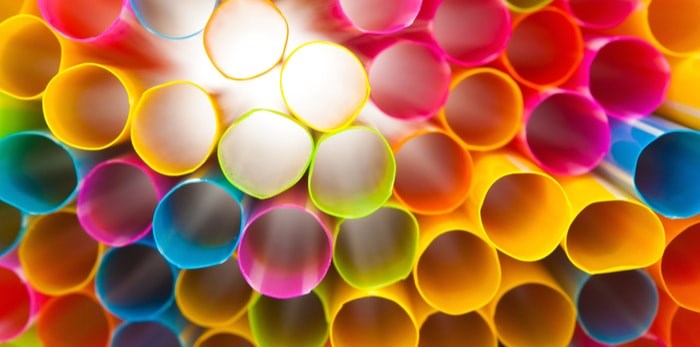 Plastic straws/Shutterstock
Plastic straws/Shutterstock
If a new bylaw is rigorously enforced on New Year’s Eve in the city of Vancouver, the slice of cake that you could not finish at the restaurant following your toast to a successful 2020 will have to be brought home in a takeout container that is not made out of expanded polystyrene foam.
As part of the Zero Waste 2040 strategy, which was approved by the previous Vancouver city council last year, foam cups and foam takeout containers will be effectively banned on January 1, 2020.
Research Co.recently asked Vancouver residents about proposals to reduce our reliance on single-use plastics. There are some drops when compared with a similar poll conducted in 2018, but the public is willing to adapt to enjoy food and beverages while reducing waste.
The ban on expanded polystyrene foam cups and takeout containers, which will be the first part of the city’s anti-plastic campaign to come into effect, is supported by 76% of Vancouverites, down nine points since 2018. This majority includes 87% of residents aged 55 and over and 84% of those who live in the west side of the city.
A similarly high proportion of Vancouverites (77%, down eight points) also supports banning the distribution of single-use plastic straws, providing appropriate exemptions are made for health-care needs. The city is expected to have a plastic straw ban in place by April 2020, but it will not encompass community care facilities and hospitals.
The single-use plastic straw has been a point of contention here and in other jurisdictions. In the United States, the Trump 2020 campaign is selling “reusable and recyclable” plastic straws as an answer to “liberal paper straws.” Some companies in Canada, including smoothie merchant Jugo Juice, have already switched to compostable straws. Starbucks has indicated it will phase out plastic straws by 2020 and has already implemented a sippy-cup-style lid for iced beverages.
Almost four in five Vancouverites (78%, down six points) agree with banning the distribution of single-use plastic utensils, unless they are directly requested by customers. In a city that offers a wide range of takeout and delivery options, residents are usually provided with plastic knives and forks that they will not use.
The level of support for these first steps is lower than it was in 2018, but not in a way that would suggest authentic animosity towards the goals established by city council. More than three in four Vancouverites think it is time to move to eliminate these single-use plastics.
There are other ideas being discussed to reduce waste, particularly when it comes to Vancouver’s fascination with coffee. City hall has claimed that almost half of the garbage collected from public garbage bins is composed of disposable cups and takeout containers.
When Research Co. asked British Columbians about their habits earlier this year, only 20% of Metro Vancouverites who have coffee outside their home acknowledged that they always use their own travel mug. One-third (34%) never do.
Aside from the ban on polystyrene foam, there is clearly an appetite among Vancouverites to do something about the sizable number of disposable cups that we go through every day.
The most popular idea, backed by 85% of residents, is to require restaurants and coffee shops to provide recycling options for the disposable cups they give out. The composition of these vessels varies from coffee shop to coffee shop, with some relying on plastic-coated paper that cannot be simply added to the “yellow bag” for recycling.
Most coffee shops offer a discount, usually $0.10, for customers who bring their own mug. Three in five Vancouverites (60%) would embrace a different model, one in which customers would pay an additional fee for the disposable cups they require when purchasing a beverage. Similar strategies have been used to limit the use of plastic shopping bags over the past few years.
In any case, almost two-thirds of Vancouverites (65%) are willing to go further and ban the distribution of disposable cups altogether – an 11-point increase since 2018.
There may be other options to contemplate in the future, including programs where takeout containers from restaurants can be brought back to be eventually reused. At this time, enabling customers to simply bring their own bowls and dishes to take food away is a contravention of health codes, unless strict sanitation guarantees are observed.
Vancouver city council is expected to reveal the next batch of bylaws before the end of the month. The survey shows that Vancouverites are wholly supportive of the initiative to reduce our reliance on plastics. We will have to wait to see whether the numbers shift once these bylaws are in place.
Results are based on an online study conducted November 12–15, 2019, among 400 adults in the city of Vancouver. The data has been statistically weighted according to Canadian census figures for age, gender and region in the city of Vancouver. The margin of error, which measures sample variability, is plus or minus 4.9 percentage points, 19 times out of 20.


